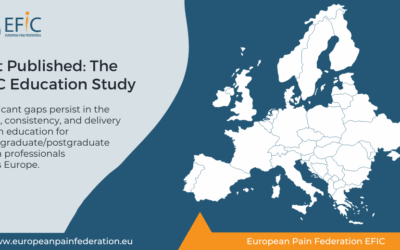
EFIC Education Study
Provision of Pain Education in Medical, Physiotherapy, Nursing, and Psychology Training Programmes across Europe
The European Pain Federation EFIC Education Committee examined the provision of Pain Education within Medical, Physiotherapy, Nursing and Psychology Training Programmes across Europe, as well as the availability of Postgraduate Pain Specialisation Options for these health professional groups. Quality of Pain Education in Training Programmes across Europe was bench-marked against the four EFIC Curricula for Pain Medicine, Pain Physiotherapy, Pain Psychology, and Pain Nursing to identify gaps in education.
Steering Committee
The study is led by Dr Mary O’Keeffe (EFIC’s Research Projects Advisor), in close collaboration with Nathan Skidmore (EFIC Research Assistant). Steering Committee Members are: Associate Professor Brona Fullen, Professor Harriet Wittink, Professor Bart Morlion, Professor Ed Keogh, Felicia Cox, Dr Andreas Kopf, and Professor Frank Huygen. Our Methodology consisted of:1. A Survey to seek programme information from Medical, Physiotherapy, Nursing, and Psychology training schools across Europe
2. Interviews with key organisations responsible for Medical, Physiotherapy, Psychology and Nursing Higher Education in Europe, and EFIC councillors
3. Consensus meetings with the Steering Committee (+ input of European Pain Forum organisations’ leadership)
The study invited individuals employed in European institutions who play a role in the delivery or development of education within these disciplines to participate. The survey received Ethical Approval from the University College of Dublin Human Research Ethics Committee.
Funding
The European Pain Federation EFIC received an unrestricted one-time grant of €32.000,- by Grünenthal for this study. Grünenthal have no role in the design, data collection, or analysis of the study results.
Results
The results of the study were published in the European Journal of Pain in May 2025 and can be accessed here.
Conclusions
Significant gaps persist in the depth, consistency, and delivery of pain education for undergraduate and postgraduate health professionals across Europe. The absence of standardised, evidence-based curricula underscores the need for consistent pain education across all disciplines. Implementing targeted educational standards, increasing interdisciplinary training, and supporting qualified educators are essential to address this fragmented landscape. Standardising pain education has the potential to greatly improve patient outcomes by equipping healthcare professionals with more effective pain management skills.
Significance Statement
This multiple method study provides an updated and comprehensive overview of the current state of pain education for healthcare professionals in Europe at undergraduate and postgraduate levels. Substantial gaps remain in the depth, consistency, and delivery of pain education for both undergraduate and postgraduate healthcare professionals across Europe. This underscores the need to enhance pain education at the undergraduate level, with EFIC’s existing medicine and physiotherapy resources offering potential models, alongside wider efforts to implement comprehensive postgraduate training. Standardising the delivery of targeted pain education has the potential to greatly improve patient outcomes by equipping healthcare professionals with more effective pain management skills.
Just Published: The EFIC Education Study
EFIC is happy to announce that the results of the EFIC Education Study were published in the European Journal of Pain in May 2025 and can be accessed here. The scoping review of 11 studies revealed a paucity of evidence, with significant heterogeneity in the hours...
DEADLINE EXTENDED: Take the Survey for the EFIC Pain Education Study now
We are pleased to announce that the deadline for completing our survey has been extended to Friday, 17 November 2023. The Survey is now ready to complete here. We are inviting individuals who are employed in European institutions and who have a role in the delivery...
Take the Survey for the EFIC Pain Education Study now
Provision of Pain Education in Medical, Physiotherapy, Nursing, and Psychology Training Programmes across Europe The European Pain Federation EFIC Education Committee are examining the provision of Pain Education within Medical, Physiotherapy, Nursing and Psychology...
